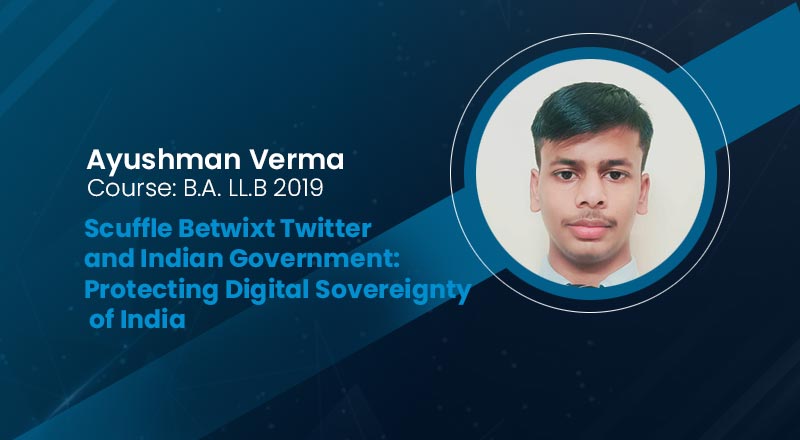Introduction
“India would not compromise its digital sovereignty”
India is a democratic country and every social media company can hold their business in the country and can earn profit but they must work honoring to the constitution of the country and laws of the land. Well this is very unerring, as India is a sovereign country and the state must maintain the supremacy of the law, the Constitution, and the sovereignty of the Country
From the past few weeks, we are witnessing a scuffle betwixt the Government of India and Social Media Companies especially, Twitter. This was mainly due to the non-compliance of the New Information technology (guidelines for intermediaries and digital media ethics code) Rules 2021 which was framed in February 2021 replacing the information technology (Intermediaries guidelines) rules 2021.
The new act came up with some responsibilities to the users of the OTT Platform and significant social media intermediaries. With a deadline of three months for the compliance of the same to the social media intermediaries. The non-compliance of the same may result in a big hit to the businesses of these companies in the country.
Protecting Digital Sovereignty: The New It Rules
Digital sovereignty or data sovereignty is all kindred to the storage and protection of the data stored in digital form, it demands that the data collected of the individuals must be kept within the country in which it resides, and must be subject to the law of the land.
In simple words it is all about the security of the individual data, the new IT rules elucidated the data intermediaries as the entities that stores or transmit the data, that encompasses online marketplace, telecom service providers, and also the social media platforms and also asked them to observe due diligence, that includes informing the privacy policy and other things to the customers against the use of their services, blocking access to unlawful information within 36 hours of the order of the court or the government, etc. It also asks them to report the cyber security incidents to the Indian Computer Emergency Response Team (ICERT).
The other thing which the rules asked is, to set up a dispute redressed mechanism which includes the appointment of a chief compliance officer and a grievance officer and publication of the monthly compliance report.
To stave off the spread of fake news and fake information, the rules also set the code for the content publishers. It also embraces the blocking of the content in the case of emergencies.
Feud between Twitter and Government
The government of India is quite serious while applying these new rules, many of the social media platforms have sought extension of the time limit, and some accepted the same while some filed a legal complaint against the government of India.
But, the way Twitter responded to the same was quite confusing, the story of the scuffle escalated when the UP Cops raided to serve the notice in a fake news case of Ghaziabad, after the denial of summoning. After few days, retorting the same Twitter showed its concern about the right to freedom of expression of people and got a censuring response from the ministry of IT, which condemned the statement as “baseless, false and an attempt to defame India to hide its own follies”.
The scuffle not ended here but got more exacerbated by the another move of Twitter, as it removed the blue badge from the account of Vice President, RSS Chief Mohan Bhagwat, and other persons related to the sangh. According to me, this move was not at all appreciable as it insulted the constitutional authority of the country.
According to me the most condemnable move of twitter was to block the account of the Law Minister of India alleging a post to be violative of an US Law. Twitter’s this move is very much censure and a direct attack on the digital sovereignty of the Country. If twitter’s this move was correct, then what message it gave to the citizens of the country, this was completely objectionable.
CONCLUSION
The state must protect the digital sovereignty of the country, and to do the same must be the priority of the government. In the past few months or years, we have witnessed many cases of violence spread through the flow of fake news in which social media platforms played a notable role, hence the move of government of the new IT rules is appreciating as it will keep a watch and hold in such cases.
India is a democracy, social media platforms in the country are free to hold their business and make a profit, but the thing is that they should work along with the Indian Constitution and the law of the land. In This case, Twitter failed to perform its duties, according to me, if it is earning from the country it must respect the constitutional authorities, some moves of twitter were very censuring and were a clear attack on the sovereignty of the country.
Ayushman Verma



